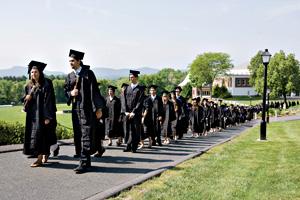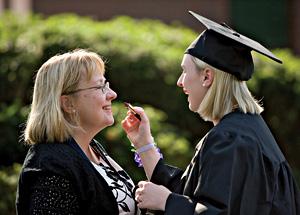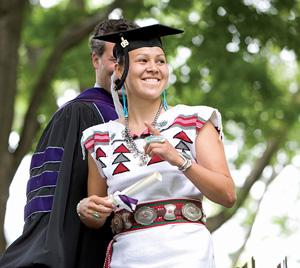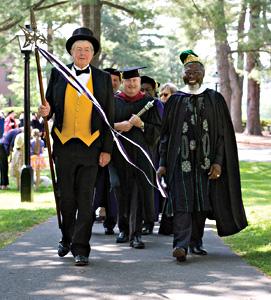The Wide Open
 Senior Marshals Nick Pastan '09, Jess Tyma '09 and Ayyappan Venkatraman '09 (hidden) lead their class to the Quad. |
In her senior year, Sara Heller ’09 began looking for jobs in advertising and marketing. Agencies weren’t hiring. “I refused to believe that there were no jobs available,” she says. She did new research, visited the Career Center, reached out to alumni and sent more résumés.
Two offers came in the week before Commencement—one from Grey Advertising in New York City, the other in pediatric psychiatry research at a hospital in Boston. By the time she took possession of her diploma, Heller, a psychology major, had accepted the job at Grey.
On Commencement day, Selena Xie ’09 was awaiting an offer from the American Red Cross. It never came. In the weeks that followed, the political science and economics major kept looking—hard—for a job in domestic or international disaster relief, a field that has interested her ever since her visit to post-Katrina New Orleans on an Abele Fellowship from Amherst.
Amherst awarded B.A. degrees on Sunday, May 24, to 419 seniors, some with jobs—including with Teach for America, Goldman Sachs and the Metropolitan Museum of Art—others without jobs. Some were headed to medical school, others to Ph.D. programs. At least eight had won prestigious fellowships or assistantships. By then, all of them were surely tired of the question, “What do you want to do with your life?” Hiring managers, parents, doctors at annual physicals—everyone was asking it. To make matters worse, relatives were telling the students, wistfully, that college really is the best four years of life. A senior couldn’t help but wonder, Is it all downhill from here?
 Carolyn Kendall '09E lends a lipstick |
“I do miss college a lot,” Heller said a month after graduation, two weeks into her job at Grey. “But I think I was ready for the next phase of my life.”
Parents start asking their children, “What do you want to be when you grow up?,” beginning when their kids are 3 or 4, said Baccalaureate speaker Nicholas V. Belcher, deacon and dean of students at the Holy Cross Greek Orthodox School of Theology in Brookline, Mass.
The ’09s were raised to seek “that perfect combination of what you’re good at, what you’re passionate about and what you love doing,” he said—and also to expect the “super grill for Memorial Day,” the midlife convertible, the white picket fence. “You’ve been optimistic that if you work hard, play by the rules, this is going to happen,” Belcher said. But, he said, “the world has changed dramatically.”
 Stacy Brossy '09 gets her degree |
After Baccalaureate, the eight honorary degree candidates gave talks related to their own callings. Three of the presentations focused on global concerns. Margaret A. Bangser ’81 spoke about her work in Tanzania to eradicate obstetric fistula, a complication of childbirth that renders women incontinent. Ngozi Okonjo-Iweala of the World Bank talked about the impact of the global economic crisis on developing countries. Historian Peter Brown, in a lecture on the Middle East, said that “a more truthful past is our only way to a more nuanced present.”
Former U.S. Rep. Thomas M. Davis III ’71 offered an insider’s account of life inside the Beltway. Andrew R. Marks ’76, M.D., talked about seeking novel cures for heart disease, muscle fatigue and muscular dystrophy. Pianist and conductor Leon Fleisher presided over a conversation about music. “I’m not worried about classical music,” he told the audience. “Those who feel a call to it will always need it.” Entrepreneur Elon Musk focused his talk on outer space, explaining that his company SpaceX aims to “lower the cost of space transportation, improve the reliability and help make it possible to make life multiplanetary.”
Frank Stella, the legendary abstract artist, lectured on the relationship between art and science at the college level. “Why bother with art when beauty, even if it can be grasped, has little ability to compete with the power of science?” he asked. “True, art can only survive, not prove itself. Nonetheless, it can ask worthwhile questions and investigate serious problems raised by its observations of nature and the nature of self.”
On Commencement morning, the seniors arrived on the Quad to a cheering crowd of fans. Douglas C. Neff ’70 served as honorary marshal. President Anthony W. Marx’s Commencement address reflected on the economic crisis. “It is the old story where we are brought low, only to discover our strength,” he said, asking, “On leaving here, how do you take the Amherst vision with you? What must you remember, in order to lead effectively and to protect us from those special interests that try to disguise themselves as the guardians of the common good?”
 Hampshire County Sheriff Robert Garvey (in yellow) leads the way, along with Neff (in red hood) and Abiodun (in green hat). |
Frank E. Stevenson II ’77 received the Medal for Eminent Service. The Obed Finch Slingerland Memorial Prize, which recognizes seniors who’ve shown “the greatest appreciation of and desire for a college education,” went to Tasha Drake ’09 and Latisha Wilson ’09. Octavia Daniela Foarta ’09 received the Woods-Travis Prize for “outstanding excellence in culture and faithfulness to duty as a scholar.”
Marshall Nannes ’09 delivered the class speech. “Liberal arts graduates love to joke about their lack of employable skills and the questionable utility of a B.A.,” he said. “Yet Amherst’s esteemed alumni have come from situations just like our own.... They too had multitudes of passions but few concrete career ideas. Yet they took their so-called ‘useless’ or ‘unemployable’ degrees and somehow put them to work, and emerged as the movers and shakers of this world.”
Two months after graduation, Xie had landed an AmeriCorps position in Austin, Texas, working with the Texas Disaster Recovery Project to study legislation related to disaster relief. She was also studying for the GREs. Disaster relief remains her passion. Heller was happily settling into the workforce, and the transition was proving to be less jarring than expected: “I run into Amherst people,” she said, “all over the place.”
Emily Gold Boutilier is editor of Amherst magazine.
Photos by Samuel Masinter '04